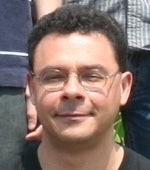
Luis Ibáñez works as Senior Software Engineer at Google Inc in Chicago. Opinions expressed in this site are his own.You can find him in github at: http://www.github.com/luisibanezand in twitter at: http://www.twitter.com/luisibanezHe previously worked as a Technical Leader at Kitware Inc., and Director of Open Source Community Development at the Open Source EHR Agent (OSEHRA). At Kitware he was closely involved in the development of open source software for medical imaging applications, in particular, working with the Insight Toolkit (ITK).Luis is a strong supporter of Open Access, and one of the editors of the Insight Journal, an OA Journal that enforces the verification of reproducibility. In collaboration with other instructors, Luis taught a course on Open Source Software Practices at RPI between 2007 and 2013, and also at the State University of New York at Albany between 2011 and 2014.Luis Ibáñez received a B.S. in Physics from the Universidad Industrial de Santander (Bucaramanga, Colombia) in 1989 and a M.S. in Optics from the same university in 1994. He received a D.E.A and Ph.D. degrees from the Universite de Rennes I (Rennes, France) in 1995 and 2000, respectively. In 1999, Luis Ibáñez joined the Division of Neurosurgery of the University of North Carolina at Chapel Hill and participated as a member of the MIDAG and CADDLab groups. His work at UNC was related to the development of algorithms for 2 and 3D registration applied to image guided surgery. He also participated as developer of the INSIGHT Registration and Segmentation Toolkit sponsored by the National Library of Medicine. Luis Ibáñez joined Kitware, Inc. in February 2002 where he was one of the main developers of the Insight Toolkit (ITK) coordinating its maintenance with other developers and the user community; he is also one of the main developers of the Image Guided Surgery Toolkit (IGSTK) and participated in crafting the operational principles of the Insight Journal. Luis Ibáñez is a strong supporter of Open Access, and the verification of reproducibility in scientific publications and is a regular speaker in ITK training courses, and in events disseminating the principles of Open Source. In August 2014, Luis joined Google Inc as Software Engineer, to work with the corporate engineering team in New York city.

Authored Comments
Ulrich,
You make a very good point,
and it also extend to a lot of infrastructure projects that are now maintained by developers who may be retiring in 10 or so years. Which is barely the window of time that it will take to pair them with younger apprentices so they can mentor them and train them to the point where the youngsters are able to continue maintaining and improving the infrastructure.
One interesting example is:
VistA: The EHR of the Department of Veterans Affairs, which has been widely accepted as one of the most advanced medical records system, but that is also suffering from a lack of younger demographics in its developers community.
If in the context of the Linux Kernel we are concerned that not enough Universities are teaching C, in the case of VistA we are concerned about only a couple of Universities teaching MUMPS, and this being the language used, not only in VistA at the VA, but also in DoD hospitals with CHCS, and in most of the commercial EHR systems, including EPIC. These systems are running in hundreds of hospitals, providing care to millions of patients, and therefore are at the core of critical infrastructure.
Josh,
Here are the commands that we used for preparing the VM:
sudo apt-get update
sudo apt-get upgrade
sudo apt-get install tmux
We followed these instructions
https://help.ubuntu.com/community/Kernel/Compile
sudo apt-get install fakeroot build-essential
sudo apt-get build-dep linux
sudo apt-get install git-core libncurses5 libncurses5-dev libelf-dev asciidoc binutils-dev
sudo apt-get install git-email
The AMI in AWS is: ami-8faaf7e6
Then, the instructions for getting the source code are here:
http://www.opensourcesoftwarepractice.org/Linux-Kernel-Training-Session-I/#/7
(slides downward)
Let us know if you run into any issues with any of the pieces.
Thanks !